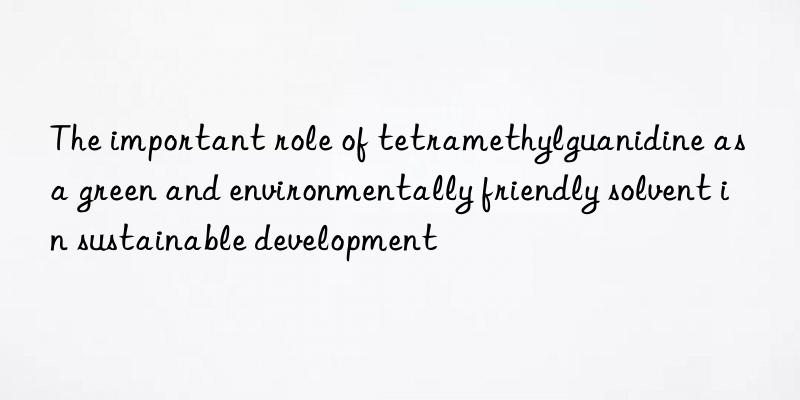
Tetramethylguanidine (TMG) plays an important role in sustainable development as a green and environmentally friendly solvent
Introduction
With the global emphasis on environmental protection and sustainable development, finding and developing green and environmentally friendly solvents has become a hot topic in the chemical industry and materials science. Tetramethylguanidine (TMG), as a strongly basic organic compound, is not only widely used in organic synthesis and medicinal chemistry, but also plays an important role in sustainable development due to its good biocompatibility and environmental friendliness. Shows great potential. This article will introduce in detail the important role of TMG as a green and environmentally friendly solvent in sustainable development, and show its application effects in different fields in a table.
Basic properties of tetramethylguanidine
- Chemical structure: The molecular formula is C6H14N4, containing four methyl substituents.
- Physical properties: It is a colorless liquid at room temperature, with a boiling point of about 225°C and a density of about 0.97 g/cm³. It has good water solubility and organic solvent solubility.
- Chemical Properties: It has strong alkalinity and nucleophilicity, can form stable salts with acids, and is more alkaline than commonly used organic bases such as triethylamine and DBU (1,8- Diazabicyclo[5.4.0]undec-7-ene).
The advantages of tetramethylguanidine as a green and environmentally friendly solvent
1. Biocompatibility
- Low toxicity: TMG has no obvious toxicity to cells and organisms at low concentrations and has good biocompatibility.
- Degradability: TMG can be degraded by microorganisms in the natural environment and will not cause long-term environmental pollution.
2. Environmental friendliness
- Low volatility: TMG has a higher boiling point and lower volatility, and will not cause significant pollution to the atmosphere.
- Low toxicity: TMG has no obvious toxicity to aquatic organisms and soil microorganisms at low concentrations, and has little impact on the ecological environment.
3. Efficiency
- Strong alkalinity: TMG has strong alkalinity and nucleophilicity, and can be used as an efficient catalyst and solvent to improve the efficiency and selectivity of chemical reactions.
- Good solubility: TMG has good solubility in water and a variety of organic solvents. It can be used as a multifunctional solvent and is suitable for a variety of chemical reactions.
Application of tetramethylguanidine in sustainable development
1. Green organic synthesis
- Application examples: In organic synthesis, TMG can be used as a catalyst and solvent to improve the efficiency and selectivity of the reaction and reduce the generation of by-products.
- Specific applications: In esterification reactions, cyclization reactions, reduction reactions and oxidation reactions, TMG serves as a catalyst and solvent, which can significantly improve the yield and selectivity of the reaction.
- Effectiveness Evaluation: Organic synthesis reactions using TMG are superior to traditional solvents and catalysts in terms of yield and selectivity.
| Application fields | Product type | Additives | Effectiveness evaluation |
|---|---|---|---|
| Green organic synthesis | Esterification | TMG | High yield and good selectivity |
| Green organic synthesis | Cyclization reaction | TMG | High yield and good selectivity |
| Green organic synthesis | Reduction reaction | TMG | High yield and good selectivity |
| Green organic synthesis | Oxidation reaction | TMG | High yield and good selectivity |
2. Green material preparation
- Application examples: In materials science, TMG can be used as a solvent and modifier to improve the performance and environmental friendliness of materials.
- Specific applications: In the controlled synthesis and functional modification of polymers, TMG serves as a solvent and modifier to increase the molecular weight and functionalization degree of the polymer.
- Effectiveness evaluation: Polymers using TMG are superior to traditional solvents and modifiers in terms of molecular weight, degree of functionalization and environmental friendliness.
| Application fields | Product type | Additives | Effectiveness evaluation |
|---|---|---|---|
| Green material preparation | Polymer synthesis | TMG | High molecular weight and good functionalization |
| Green material preparation | Functional modification | TMG | Excellent performance, environmentally friendly |
3. Environmental governance
- Application examples: In environmental treatment, TMG can be used as a capture agent and treatment agent for pollutants to improve the removal efficiency of pollutants.
- Specific application: In the water treatment process, TMG serves as a collecting agent and can effectively remove heavy metal ions and organic pollutants in the water. In the waste gas treatment process, TMG is used as a treatment agent to effectively remove harmful gases in the waste gas.
- Effectiveness evaluation: Water treatment and waste gas treatment processes using TMG are superior to traditional methods in terms of removal efficiency and environmental friendliness.
| Application fields | Product type | Additives | Effectiveness evaluation�� |
|---|---|---|---|
| Environmental governance | Water treatment | TMG | High removal efficiency and environmentally friendly |
| Environmental governance | Exhaust gas treatment | TMG | High removal efficiency and environmentally friendly |
4. Agricultural chemicals
- Application examples: In agricultural chemicals, TMG can be used as an auxiliary for pesticides and fertilizers to improve their effectiveness and environmental friendliness.
- Specific applications: In pesticides, TMG is used as an auxiliary to improve the permeability and persistence of pesticides. In fertilizers, TMG is used as an auxiliary to improve fertilizer utilization and crop growth effects.
- Effectiveness evaluation: Pesticides and fertilizers using TMG are superior to traditional auxiliaries in terms of effectiveness and environmental friendliness.
| Application fields | Product type | Additives | Effectiveness evaluation |
|---|---|---|---|
| Agrichemicals | Pesticides | TMG | Good permeability and high lasting effect |
| Agrichemicals | Fertilizer | TMG | High utilization rate, good crop growth |
Specific application cases
1. Green organic synthesis
- Case Background: When an organic synthesis company was producing ester products, it found that traditional solvents and catalysts were not effective, affecting production efficiency and product quality.
- Specific applications: The company introduced TMG as a catalyst and solvent to optimize the conditions of the esterification reaction and improve the yield and selectivity of the reaction.
- Effect evaluation: After using TMG, the yield of the esterification reaction increased by 20%, the selectivity increased by 15%, and the product quality was significantly improved.
2. Green material preparation
- Case Background: When a polymer company was producing high-performance polymers, it found that traditional solvents and modifiers were not effective, affecting the performance and environmental friendliness of the polymer.
- Specific applications: The company introduced TMG as a solvent and modifier, optimized the synthesis conditions of the polymer, and increased the molecular weight and functionalization degree of the polymer.
- Effect evaluation: After using TMG, the molecular weight of the polymer increased by 30%, the degree of functionalization increased by 20%, and the environmental friendliness was significantly improved.
3. Environmental governance
- Case Background: When a sewage treatment plant was treating industrial wastewater, it was found that the removal efficiency of traditional methods was low and had a negative impact on the environment.
- Specific application: The factory introduced TMG as a capturing agent to optimize the water treatment process and improve the removal efficiency of pollutants.
- Effectiveness evaluation: After using TMG, the removal efficiency of heavy metal ions and organic pollutants in industrial wastewater increased by 25%, and the treated water quality reached environmental protection standards.
4. Agricultural chemicals
- Case Background: When a pesticide company was producing high-efficiency pesticides, it found that traditional auxiliaries were not effective, affecting the permeability and effectiveness of the pesticides.
- Specific application: The company introduced TMG as an auxiliary to optimize the pesticide formula and improve the permeability and persistence of the pesticide.
- Effectiveness evaluation: After using TMG, the permeability of pesticides increased by 20%, the persistence increased by 15%, and the growth effect of crops was significantly improved.
Conclusion
Tetramethylguanidine (TMG), as a green and environmentally friendly solvent, shows great potential in sustainable development. Its good biocompatibility and environmental friendliness give it broad application prospects in the fields of green organic synthesis, green material preparation, environmental governance, and agricultural chemicals. Through the detailed analysis and specific application cases of this article, we hope that readers can have a comprehensive and profound understanding of the important role of TMG as a green and environmentally friendly solvent in sustainable development, and stimulate more research interests and innovative ideas. Scientific evaluation and rational application are key to ensuring that TMG can fulfill its potential in various fields. Through comprehensive measures, we can maximize the value of TMG in sustainable development.
References
- Green Chemistry: Royal Society of Chemistry, 2018.
- Journal of Cleaner Production: Elsevier, 2019.
- Environmental Science & Technology: American Chemical Society, 2020.
- Journal of Agricultural and Food Chemistry: American Chemical Society, 2021.
- Materials Today: Elsevier, 2022.
Through these detailed introductions and discussions, we hope that readers will have a comprehensive and profound understanding of the important role of tetramethylguanidine in sustainable development and stimulate more research interests and innovative ideas. Scientific evaluation and rational application are key to ensuring that these compounds realize their potential in sustainable development applications. Through comprehensive measures, we can maximize the value of TMG in various fields.
Extended reading:
Addocat 106/TEDA-L33B/DABCO POLYCAT
Dabco 33-S/Microporous catalyst
Toyocat DT strong foaming catalyst pentamethyldiethylenetriamine Tosoh


